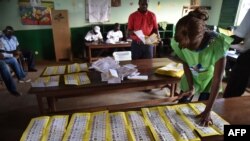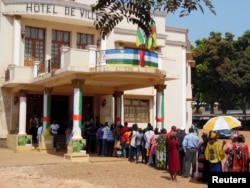Late last year, the Central African Republic held elections to replace the transitional government currently in power. The elections were seen as a welcome indicator of stability and a first step toward putting an end to the country's three-year conflict.
However, the rushed vote — held Dec. 30, 2015 — was marred by logistical difficulties and irregularities.
Earlier this month, a majority of the 30 presidential candidates asked authorities to stop the vote counting. On Tuesday, two losing candidates, Desire Kolingba and Martin Ziguele, demanded a manual recount of the vote, saying that widespread irregularities undermined the credibility of the results.
"We believe that elections are a first step out of the country's crisis,” Kolingba said. “However, what we have seen during the voting and the counting of votes makes us question the credibility of the vote."
On the day of the elections, many polling stations opened late or lacked material such as ballot papers or updated voters lists. In some areas, people were not able to vote.
One-point-eight million people had registered for the country's first presidential and legislative elections since the Seleka rebels ousted ex-president Francois Bozize and took power in 2013. The elections are seen as a first step to bringing the country out of its conflict, says the U.N. head of mission, Parfait Onanga-Anyanga.
However, an election that's seen as unfair and dishonest — and even marred by fraud — might affect the reconciliation process and continued stability.
"To have a government elected by the Central Africans is an important step toward ending the crisis,” Onanga-Anyanga said. “Our role is to assist them in this process. Now it (the elections) is a human effort, naturally it's not perfect. Our goal is to ease the process to make the elections as credible as possible."
It is now up to the country's Constitutional court to review the vote and announce the final results. The court may ask to redo the parliamentary elections in some constituencies, but is not likely to cancel the first round of the elections or make any revisions that significantly affect the provisional results.
Two presidential candidates, Anicet George Dologuele and Faustin Archange Touadera, gained enough votes to go through to a second round.
Whoever wins will face significant challenges restoring democracy and bringing the conflict to an end, including disarming the militia and rebel groups, restoring the country's security forces and finding a solution for the close to one million Central Africans displaced by the conflict.





